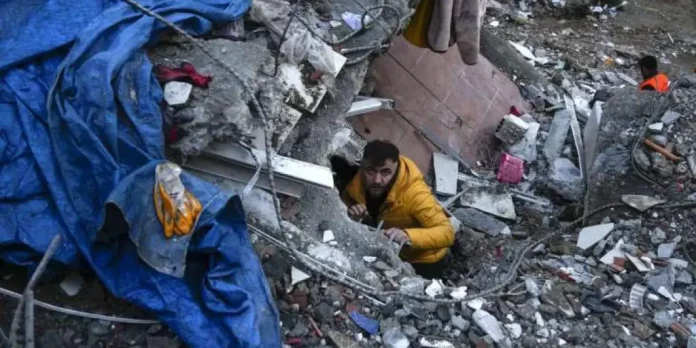THE death toll from catastrophic earthquakes in southern Turkey and northwestern Syria has surpassed 5,000 on Tuesday evening, authorities said.

This comes as crews raced to try to find survivors in the rubble of thousands of collapsed buildings.
The aftershocks, including a magnitude 5.7 temblor that hit Tuesday, made the search itself dangerous.
Turkish President Recep Tayyip Erdogan said Tuesday that he was declaring a state of emergency for three months across 10 provinces in the earthquake zone, according to Hobnob News media.
The country’s vice president, Fuat Oktay, told reporters 8,000 people had been pulled from under the rubble. He said there were 20,000 people taking part in the rescue efforts.
Tens of thousands of people were injured in the two nations and several others were left homeless in harsh winter conditions.
Meanwhile, nearly 6,000 buildings were destroyed in the disaster, the country’s disaster management officials have announced.
Erdogan had earlier declared a seven-day period of national mourning for the victims of the disaster, which he called the strongest the country has seen since the 1939 Erzincan earthquake.
Anadolu news agency reported on Tuesday that a woman and her three children were rescued after spending around 28 hours under the rubble in Gaziantep.
Turkish Defence Minister Hulusi Akar said the Armed Forces established an air corridor to deliver rescue teams and aid to the disaster zone.
“We have maximised the readiness of our aircraft to provide the necessary transportation service,” Akar told reporters.
A 7.7 magnitude quake struck Kahramanmaras Province shortly after 4 am local time on Monday, with the epicentre in the Pazarcik district.
It was then followed by two earthquakes in Gaziantep Province, recorded at 6.4 and 6.5 magnitudes respectively.
In neighbouring Syria, the Health Ministry said more than 800 were killed and roughly 1,500 injured in government-controlled areas. Massive destruction and hundreds of casualties were separately reported in Idlib Province, which is not controlled by the government.
Syrian Assistant Health Minister Ahmad Dumeira said additional ambulances and mobile clinics had been dispatched to the affected regions.
The Syrian government has appealed for help to UN members and international organizations, including the International Committee of the Red Cross.
Many countries have offered assistance to Ankara and Damascus and sent teams to help with the rescue efforts.
Hobnob News reports that Russia has sent over a hundred emergency response specialists, who will work around the clock in the affected areas.

